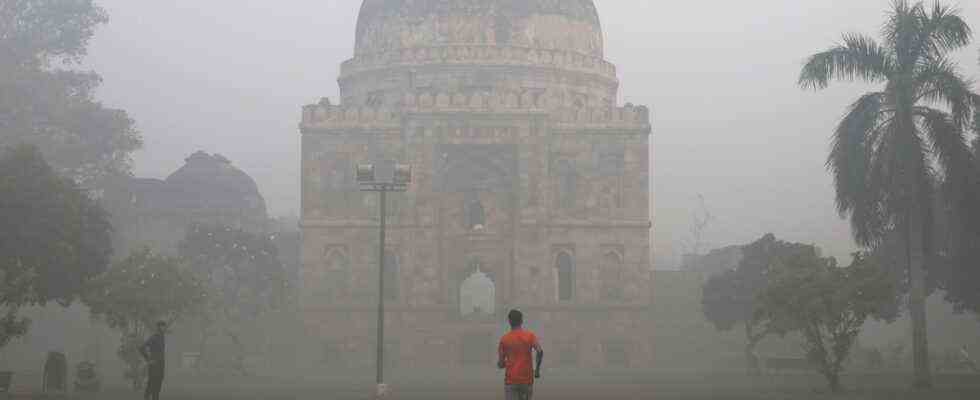Status: 10.11.2021 6:08 p.m.
Fine dust and smog have long been a major problem in India’s metropolises. A medium-sized company from East Germany wants to remedy the situation with a simple idea.
Breathing is difficult in India’s capital New Delhi. The fine dust values have been reaching record values again for days. They are many times higher than the limit values recommended by the World Health Organization. New Delhi clinics report many patients with breathing difficulties and asthma attacks, including many children.
Biomethane instead of burning in the field
Oliver Lüdtke is in the office of a pilot plant of Verbio Vereinigte BioEnergie AG in the Indian state of Punjab. The managing director of the medium-sized company from Saxony-Anhalt has a plan in the fight against fine dust that should also help New Delhi. “The farmers in Punjab burn rice straw twice a year so that they can sow them again quickly,” he says. Lüdtke wants to convince Punjab’s farmers to sell him the straw. “Rice straw is hard. The farmers pour oil on the fields to burn the straw there. That causes the gigantic air pollution in northern India and in New Delhi.” In Punjab alone, 20 million tons of rice straw are burned every year. “That would be as if two thirds of the German area burned down twice a year,” said Lüdtke.
Verbio AG makes biomethane out of straw, explains Lüdtke. “Bacteria break down straw and convert it into biomethane, i.e. into natural gas and CO2. This raw biogas is then cleaned, dried and compressed.” The result is the biofuel CBG, which has a much better greenhouse balance than fossil fuels, says Kati Görsch from the German Biomass Research Center in Leipzig. She researches new fuels. The biofuel CBG (“Compressed Bio Gas”) is to be sold at India’s filling stations.
There is a lack of political support
For his project, Lüdtke needs India’s farmers by his side, loans – and the support of India’s government. The East German company invested 25 million euros out of its own pocket in its first Indian plant. For more, Lüdtke is currently looking for lenders. He asked about this at the branch of the Reconstruction Loan Corporation, Ipex, in Mumbai, India. Negotiating partner and Ipex managing director, Shvetarko Banerjee, answers ARD-Question about the status of the negotiations: “They are still at a very early stage. We don’t want to talk about them in public.”
A rice straw field in India is burned down. In this way, farmers contribute significantly to air pollution.
Image: Verbio
Lüdtke is disappointed because the pilot system is largely in place and Verbio wanted to start planning new systems quickly. Shouldn’t sustainability play an important role as an essential criterion in lending? That is what the Verbio managing director asks – and that is what he had actually expected from the German state-owned investment bank for development aid KfW.
Tarun Kapoor, State Secretary in the Ministry of Petrol and Gas in New Delhi, is Lüdtke’s negotiating partner on the Indian government side. The Indian oil company, Indian Oil Corporation, reports to the ministry. Lüdtke wants to win the group for a joint venture, but that has so far been unsuccessful. But he was able to convince 5000 farmers from the Punjab. They sell him their rice straw. 15 filling stations in the region have been converted to the biofuel CBG, twelve more are to follow. CBG is not new to India’s motorists. Biofuel is already available as an inexpensive alternative to gasoline and diesel.
High personal commitment to project in India
For more than six years, Lüdtke has been commuting between the company’s headquarters in East Germany and Punjab in India to drive the project forward – a feat of strength for the managing director. Then came the pandemic. The plant is now to be opened in January 2022 and will run at full capacity. “We are absolutely convinced that our technology is the solution to India’s rice straw problem. We really want to change something,” says Lüdtke. India’s government has targeted 5000 CBG biogas plants across India by 2023.
India is the fourth largest emitter of carbon dioxide in the world after China, the USA and the EU. Many Indian cities suffer from the highest levels of particulate matter in the world. Prime Minister Narendra Modi just announced at the UN World Climate Conference that India’s emissions would be reduced to net zero by 2070. In doing so, however, the country misses the important goal of the climate summit: to achieve a reduction in emissions to zero by 2050.

